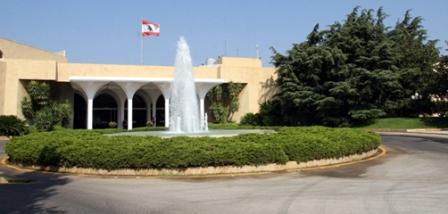Garbage Bag-Sized Ambitions
Ahmad El-Assaad/March 11/16
The garbage scandal we’ve been living with for months has tossed away all crucial political issues in the bin of negligence and oblivion, which are what brought the country to this situation, to begin with. None of the Lebanese people, unfortunately, care anymore about the presidency, nor about electing a President for the Republic. The vacuum in the Baabda Presidential Palace has become a normal thing that requires no special attention. None of the Lebanese people are noticing that their men are fighting in Syria either, in a land other than their own, for a goal other than their cause, in a war that is not theirs to fight. The Lebanese people only care about staying in their jobs, about their institutions not shutting down because of the economic recession, which would leave them without an income to support them. Those folkloric gatherings, known as the National Dialogue, turned into a silly Mexican soap opera, no longer interest the Lebanese people. All of the problems facing Lebanon today should be extra motivation for all the Lebanese people, in order to change the political status quo. All around the world, sound politics are the basis of a sound society, economy and environment. But the pitiable times we, in Lebanon, are living in, reflects the inferiority of the ruling political class, all colors included. It is absolutely impossible to solve any problems pertaining to livelihood or the environment, unless this political class is changed.
Lebanon must not repeat its experience with Palestinian refugees
Nayla Tueni/Al Arabiya/March 11/16
In an op-ed published last month, Yezid Sayigh, senior associate at the Carnegie Middle East Center in Beirut, discussed smarter assistance for Syrian refugees. This appeared following the international donor conference, which was held in London earlier that month and which pledged more than $11 billion to assist Syrian refugees and the internally displaced people in 2016-2020.
Sayigh noted that the “EU-Turkey joint action plan on refugees agreed on November 2015 has not yielded significant results,” and said that “the underfunding of past United Nations appeals for Syria has risen proportionally – from 30 percent of pledges in 2012 to 43 percent in 2015.” He added that “the international donor community must break away from its default fire-fighting mode to thinking strategically about long-term trends, needs, and responses.”
Such insights confirm our fear of a “new resettlement” similar to what happened when the Palestinians were displaced in 1948. Back then, United Nations institutions aided them; however, this was insufficient and Palestinians’ temporary residences turned into camps of poverty, misery, terrorism and chaos. As a result, the residents of these camps suffered the most as they’ve become the victims of this environment.
The United Nations Relief and Works Agency (UNRWA) is currently failing in its duties towards Palestinian refugees in Lebanon who are frequently protesting the shortage of aid and are voicing fear that this aid will stop altogether. This scenario worries them as it leaves them to confront their fates alone in a country that is incapable of providing for its own citizens.
This injustice has turned into hostility between the Palestinian people and their host, i.e. Lebanon and its people. It is no longer possible to provide good integration as a lot more is required than mere eloquent speeches which do not provide a better livelihood situation or hospitalization or other necessary aid.
System’s incapability
The problem with the Syrian refugees in Lebanon may escalate like what happened with the Palestinian refugees. The Lebanese people’s fears are thus increasing due to the government, or perhaps the entire system’s incapability, to deal with urgent matters. The number of Syrian refugees has reached 2 million when the country’s population itself is 4 million. This is a huge number which impacts any small country on the economic and social levels.
UNRWA is currently failing in its duties towards Palestinian refugees in Lebanon who are frequently protesting the shortage of aid and are voicing fear that this aid will stop altogether.
In addition, the security situation is not well-monitored and the society may be infiltrated by terrorists from ISIS or other groups or by intelligence members of the Syrian regime, which has always sought to harm Lebanon’s security, stability and sovereignty.
If the underfunding of United Nations toward Syrian refugees has reached 43 percent, this means that the international community does not meet its full obligations. The situation may become more difficult if oil prices continue to drop or settle at their current price. This is in addition to the many wars and battles across the world. All of this negatively affects economies and countries’ capabilities to provide help.
We still don’t know how much of the $11 billion – which the international donor conference in London pledged to provide for Syrian refugees – will be allocated for Lebanon. However, it is certain that it will be a small amount considering the Syrian refugees’ growing needs. What is also certain is that we are in trouble. This is a crisis that will not end unless there is a solution for the Syrian refugees to return home as otherwise we are ahead of a situation that resembles our situation with the Palestinians.






















